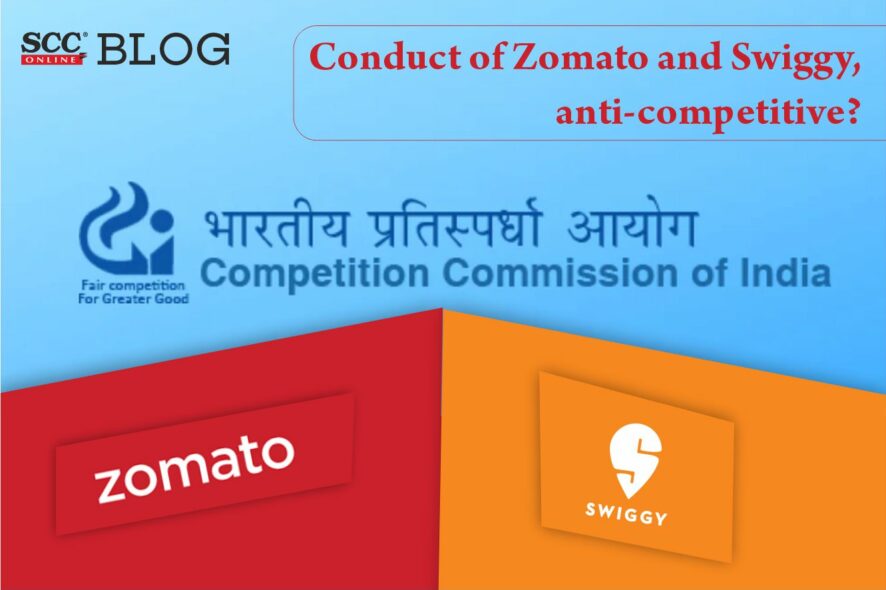Competition Commission of India (CCI): The Coram of Ashok Kumar Gupta (Chairperson) and Sangeeta Verma and Bhagwant Singh Bishnoi (Members) held that, in the case of both Swiggy and Zomato, prima facie there existed a conflict of interest situation, warranting detailed scrutiny into its impact on the overall competition between the RPs vis-à-vis the private brands/entities which the platforms may be incentivised to favour.
An information had been filed under Section 19(1)(a) of the Competition Act, 2002 by National Restaurant Association of India (Informant/NRAI) against Zomato and Swiggy (OPs) alleging that the practices of Zomato and Swiggy were in violation of Section 3(4) read with Section 3(1) of the Act.
Factual Background
NRAI submitted that the OPs provide restaurant partners (RPs) a listing service and allow consumers to interact with them through their platforms.
Further, NRAI stated that it is only because of the network effects of the OPs that, despite their anti-competitive practices, RPs are still dependent on the platforms to earn revenues, which shows the absence of countervailing buyer power with the RPs.
Bundling of Food Delivery
It was alleged that the stated delivery services are not optional for the RPs who wish to avail listing service and they are forced to take the delivery service of the platform.
Adding to the above, NRAI stated that the bundling of delivery services is an unfair imposition.
It is violative of Section 19(3) of the CCI Act.
Data Masking
RPs receive no data or information about the end-consumers to whom the food is delivered, which is a practice of OPs.
Due to the above-stated, RPs are not aware of where the foods is being delivered, to whom and in how much time, which creates a lack of transparency.
Vertical Integration
NRAI has further alleged that OPs are engaging in a dual role on their platform where they list their own cloud kitchen brands exclusively on their platform, akin to private labels, thereby creating an inherent conflict of interest in the platform’s role as an intermediary on one hand and as a participant on the other hand.
One-Sided Contracts
It was alleged that Zomato and Swiggy enter into one-sided contracts with RPs owing to their superior bargaining power.
Further, NRAI has alleged that Zomato and Swiggy often compel the RPs to commit exclusively to be listed on their respective platform through incentives, lower commissions etc. to maintain their competitive edge in the market, at the exclusion of other new entrants. This creates/strengthens barriers for a new entrant into the market which would find itself deprived of essential and interdependent inputs like RPs and customers which would be locked-in to the incumbents’ platforms.
Infact, price parity terms have also been imposed on the RPs through their respective contracts.
NRAI has also alleged that the commissions which are charged by the OPs from RPs are unviable and are to the tune of 20% to 30%, which are extremely exorbitant for the RPs.
In view of the above allegations, NRAI sought an inquiry under the Act against the OPs.
Analysis and Decision
Coram stated that it emerged from the claims made by Zomato and Swiggy that bundling delivery with ordering enables them to control the time taken for delivery and qualitatively standardise such delivery for the end consumer.
In Commission’s opinion, bundling did not seem to raise any competition concern as such. Even otherwise, the Informant was not able to substantiate its claim that bundling of delivery with ordering, in itself, led to cause AAEC either between restaurants or between hyperlocal delivery service providers.
Moving further, the Commission was of the view that prima facie a conflict-of-interest situation arose in the instant case, both with regard to Swiggy and Zomato, because of the presence of commercial interest in the downstream market, which may come in the way of them acting as neutral platforms.
Coram added that the above-said required detailed examination and further, remarked that,
Given that platforms are vertically related with the RPs, including their private brands and those operating through their respective cloud kitchens, such arrangements whereby preferential treatment is accorded to some entities can be looked as a potential contravention of Section 3(4) read with Section 3(1) of the Act.
Both Swiggy and Zomato operate as major intermediary platforms in the food delivery space, underscoring their market power and ability to adversely as well as appreciably affect the level playing field.
Commission also observed that a holistic examination is required to ascertain whether the intermediaries prevent competition on merits, creating an ecosystem likely to cause an appreciable adverse effect on competition.
Further, the price parity clause may discourage the platforms from competing on a commission basis as RPs need to maintain similar prices on all platforms and provide similar prices to the customers, regardless of the commission rates paid to the platform. Hence, the said arrangements can cause AAEC on the market, therefore investigation is made out.
In Commission’s opinion, the allegations pertaining to delayed payment cycle, imposition of one-sided clauses in the agreement, charging of exorbitant commission etc., they did not seem to have an effect on competition.
Concluding the matter, Commission held that prima facie with respect to the conduct of Zomato and Swiggy, investigation by the DG to determine whether the conduct of the OPs have resulted in contravention of the provisions of Section 3(1) of the Act read with Section 3(4) was required.[National Restaurant Association of India v. Zomato India Ltd., 2022 SCC OnLine CCI 22, decided on 4-4-2022]






